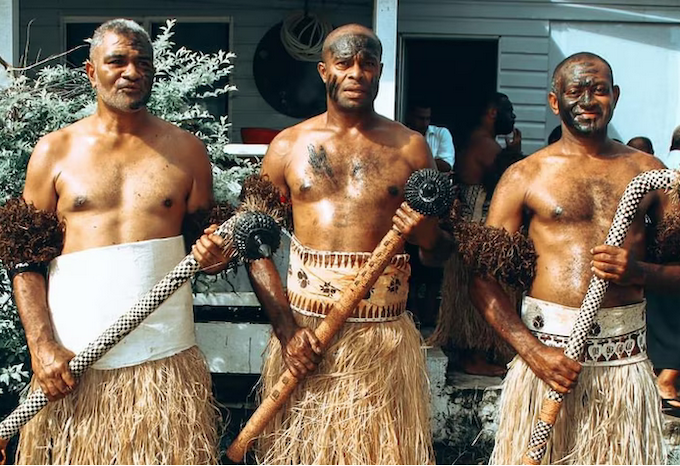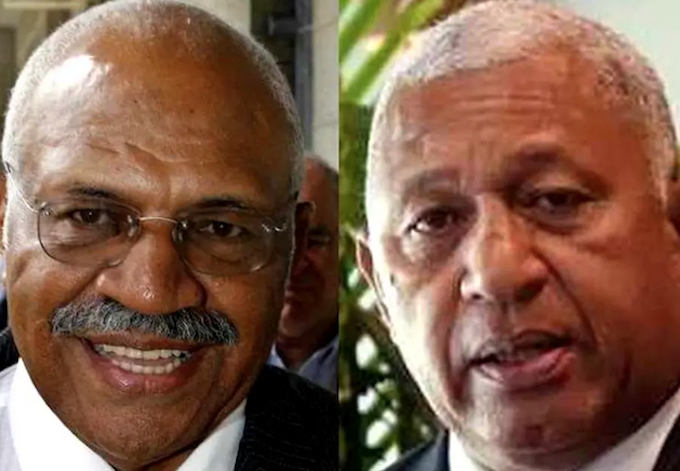
By the ABC’s Fiji reporter Lice Movono and Pacific Local Journalism Network’s Nick Sas in Suva
Some described it as a case of looking back to go forward.
This past week in Fiji — a place where politics, race, the army and tradition mix together in an often potent stew — the Great Council of Chiefs, a organisation banished for almost two decades, came together to re-establish its place in modern Fiji.
It came on the same week a regional body of traditional leaders, including a Māori king and princess, Samoan king and Fiji’s chiefs, met on Fiji’s sacred island of Bau to discuss ways of becoming more entrenched in politics and the big decisions affecting the region.
This new push comes at a time when governments in countries such as New Zealand are pushing back against traditional influence, with Māori language and specific social services being abolished.
For some commentators, it reflects a new Fiji and a more mature Pacific region: something that should be encouraged to meld together aspects of traditional life into modern society.
Yet for others, it brings back memories of a time of fear and division.
“The Great Council of Chiefs has committed a lot of mistakes in the past, including being used by some as a leverage for ethnonationalism and racial hatred,” political sociologist Professor Steven Ratuva told the ABC.
“It needs to rise above that and must function and be seen as a unifying, reconciliatory and peace-building body.”
Fiji’s highest chiefly political body, the Great Council of Chiefs has reconvened for the first time in 16 years.
ABC Pacific’s Lice Movono reports from Bau Island in Tailevu, Fiji. pic.twitter.com/6gfbDNcpMa
— ABC Pacific (@ABCPacific) May 25, 2023
‘Times have changed’
The Great Council of Chiefs (GCC), known as Bose Levu Vakaturaga in Fijian, dates back to colonial times. Established in 1876, the council was used as an advisory body for the British colonial rulers.
After Fiji’s independence in 1970, the GCC became entrenched in the constitution, with chiefs acting as a significant part of Fiji’s Senate. During the next three decades it had periods of waxing and waning influence, with its independence and political interference often under the spotlight.
Most notably, as an organisation to promote and represent indigenous Fijians (the iTaukei), it was accused by some of sidelining Fiji’s substantial Indo-Fijian population — which makes up about 35 per cent of Fiji — and in turn stoking racial tension.
In his 2006 coup, military strongman Voreqe Baninimarama took over the country and eventually abolished the GCC, which he considered a threat to his autocracy, famously telling chiefs to “go drink homebrew under a mango tree”.

But after winning the December 2022 election, and in turn removing Bainimarama’s 16-year grip on power, Fiji’s new prime minster Sitiveni Rabuka, himself a former coup leader, re-established the GCC.
Rabuka last week told the 54 chiefs of the GCC — of which only three are women — that “peace must be its cornerstone”.
“While the body is intrinsically linked to the governance and well-being of the iTaukei [traditional Fijians], it carries a profound obligation to embrace and advocate for every member of our diverse society,” Rabuka said.
Ratu Viliame Seruvakula, a military commander under the former Fijian government who worked with the United Nations for almost two decades, was last week elected as the GCC’s new chairperson.
“Times have changed,” Seruvakula said.
“It’s quite obvious that for the last 15 years, people have become more aware in looking [for] something to help guide them forward.”
And in a move that has drawn parallels to Australia’s failed Indigenous Voice to Parliament, he wants the GCC to be a “statutory body with its own machinery and own mechanism.”
“I think this is heading in the right direction [to] really go forward and move iTaukei forward.” he said.
The ‘politics of prestige’
About 60 percent of Fiji is indigenous, with the iTaukei population, particularly in regional areas of Fiji, dealing with emended issues of systemic poverty, drugs, crime, unemployment and domestic violence.
Some in Fiji think the re-establishment of the GCC will help address these issues.
Yet, for Professor Steven Ratuva, political sociologist and director of the Macmillan Brown Centre for Pacific Studies at the University of Canterbury, it is not an easy fix.
“The question of how the GCC will serve the interests of the iTaukei needs serious discussion,” he said.
“Simply using the old style of chiefly protocol, politics of prestige and struggle for power have not worked in addressing the worsening situation — in fact, these contributed to some of the problems youths today are now facing.”
And, he said, the racial issue must be addressed.
“How will it protect other ethnic groups? This has to be made very clear to ensure that the anxiety and worries are addressed amicably and trans-ethnic trust is established.”
The professor in comparative politics at Victoria University of Wellington, Jon Fraenkel, agreed.
“It has played a questionable role [in Fiji] in the past,” he said. “But I think [overall] that the restoration of the GCC is a positive move.”
The GCC will meet later this year to establish its goals and timeline.
GCC leaders will also be part of a Pacific Traditional Leaders Forum to be held in Hawai’i in June, a new body established last week on Bau Island — which met before the GCC meeting — to promote the input of traditional leaders in decision-making.
Professor Fraenkel said that at this early stage it was difficult to know whether it was part of a concerted trend across the region for traditional leaders to have more say.
“Again, to have greater links between government and community leadership is a positive thing,” he said.
“It’s the case in many countries in the Pacific that the village level or the local level, chiefs can still be extremely important.
“But I don’t think that linking traditional leaders up with their people is going to be done in Hawai’i, it’s going to be done back home, in the community.”
Republished with permission from ABC Pacific News.











































